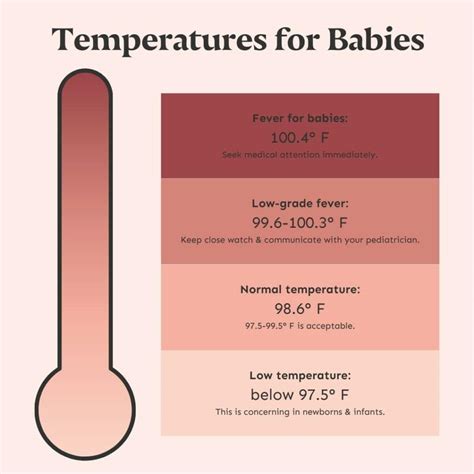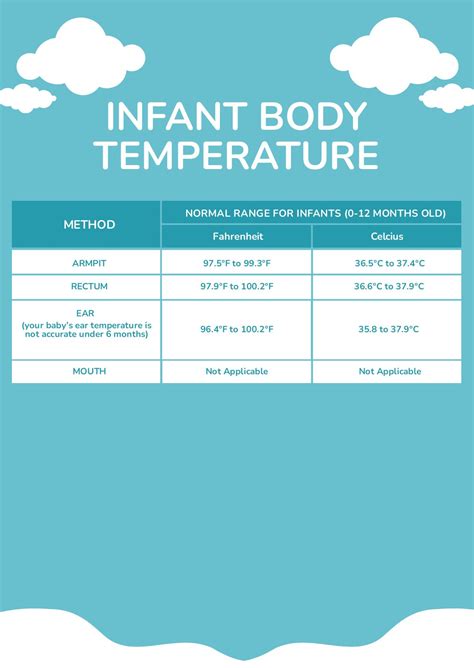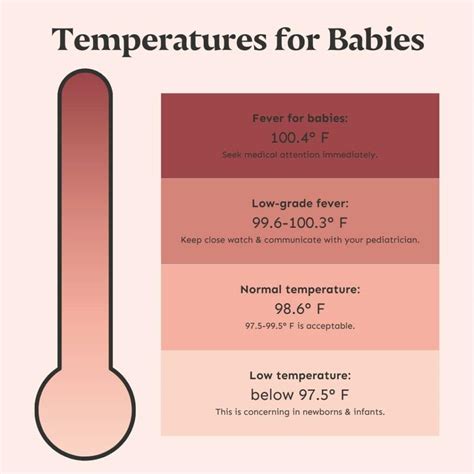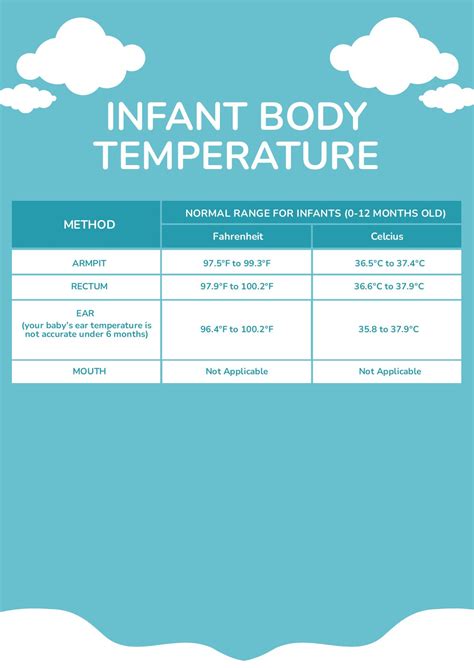Intro
Learn about normal infant body temperature ranges, newborn temperature regulation, and baby fever signs, understanding whats healthy and when to seek medical help for your little ones thermal well-being.
Maintaining an optimal body temperature is crucial for infants, as it plays a significant role in their overall health and development. Normal body temperature in infants is a topic of great interest to parents and caregivers, as it can be an indicator of their little one's well-being. In this article, we will delve into the world of infant body temperature, exploring what is considered normal, how to measure it, and what factors can influence it.
The importance of monitoring an infant's body temperature cannot be overstated. It is a vital sign that can provide valuable insights into their health, helping parents and caregivers to identify potential issues early on. By understanding what constitutes a normal body temperature in infants, parents can take steps to ensure their baby remains healthy and thrive. Moreover, being aware of the factors that can affect body temperature can help parents take preventive measures to maintain their infant's optimal temperature.
As we explore the topic of infant body temperature, it is essential to note that the American Academy of Pediatrics (AAP) provides guidelines for parents and caregivers to follow. These guidelines emphasize the importance of monitoring an infant's temperature, especially during the first few months of life. By following these guidelines and being mindful of their infant's temperature, parents can help prevent complications and ensure their baby receives the best possible care.
What is Normal Body Temperature in Infants?

Normal body temperature in infants can vary slightly depending on the age of the baby and the method used to measure the temperature. Generally, a normal body temperature for infants is considered to be between 97.7°F (36.5°C) and 99.5°F (37.7°C). However, it is essential to note that these values can fluctuate throughout the day, with temperatures tend to be higher in the evening and lower in the morning.
Factors that Influence Infant Body Temperature
Several factors can influence an infant's body temperature, including their age, environment, and overall health. For example, newborns (0-3 months) tend to have a higher body temperature than older infants, with an average temperature of 98.6°F (37°C). As infants grow and develop, their body temperature tends to decrease, with an average temperature of 98°F (36.7°C) for infants between 3-6 months.Additionally, the environment can play a significant role in influencing an infant's body temperature. For instance, if an infant is overdressed or in a warm environment, their body temperature may rise. On the other hand, if an infant is underdressed or in a cool environment, their body temperature may drop.
How to Measure Infant Body Temperature

Measuring an infant's body temperature can be done using various methods, including digital thermometers, ear thermometers, and rectal thermometers. Each method has its advantages and disadvantages, and it is essential to choose the most suitable method for the infant's age and comfort level.
Digital thermometers are a popular choice for measuring infant body temperature, as they are quick, easy to use, and provide accurate readings. Ear thermometers, on the other hand, can be more challenging to use, especially in newborns, as their ear canals are small and delicate. Rectal thermometers are also commonly used, especially in newborns, as they provide accurate readings and are relatively easy to use.
Benefits of Monitoring Infant Body Temperature
Monitoring an infant's body temperature has numerous benefits, including early detection of potential health issues, prevention of complications, and promotion of overall health and well-being. By regularly checking an infant's temperature, parents and caregivers can identify any abnormalities or changes in their infant's health, allowing them to seek medical attention promptly.Moreover, monitoring infant body temperature can help prevent complications, such as fever-related seizures, dehydration, and heatstroke. By being aware of their infant's temperature, parents can take preventive measures, such as dressing their baby lightly, ensuring adequate hydration, and providing a cool environment.
Common Issues Related to Infant Body Temperature

There are several common issues related to infant body temperature that parents and caregivers should be aware of. These include fever, hypothermia, and heatstroke. Fever is a common issue in infants, especially during the first few months of life, and can be caused by various factors, such as infection, vaccination, or environmental factors.
Hypothermia, on the other hand, occurs when an infant's body temperature drops below 97.7°F (36.5°C). This can be caused by factors such as exposure to cold environments, inadequate clothing, or underlying medical conditions. Heatstroke, a more severe condition, occurs when an infant's body temperature rises above 104°F (40°C), and can be caused by factors such as overheating, dehydration, or underlying medical conditions.
Prevention and Treatment of Infant Body Temperature Issues
Preventing and treating infant body temperature issues requires a combination of awareness, education, and prompt medical attention. Parents and caregivers can take preventive measures, such as dressing their baby lightly, ensuring adequate hydration, and providing a cool environment, to reduce the risk of fever, hypothermia, and heatstroke.If an infant develops a fever, parents can use acetaminophen or ibuprofen to help reduce the temperature, under the guidance of a healthcare professional. For hypothermia, parents can use warm blankets, warm baths, or a warm environment to help increase their infant's body temperature. In cases of heatstroke, parents should seek immediate medical attention, as prompt treatment is essential to prevent complications.
Conclusion and Recommendations

In conclusion, monitoring an infant's body temperature is a crucial aspect of their care, as it can provide valuable insights into their health and well-being. By understanding what constitutes a normal body temperature in infants, parents and caregivers can take steps to ensure their baby remains healthy and thrive. Regularly checking an infant's temperature, being aware of factors that can influence it, and taking preventive measures can help prevent complications and promote overall health.
We recommend that parents and caregivers follow the guidelines provided by the American Academy of Pediatrics (AAP) and consult with their healthcare professional if they have any concerns or questions about their infant's body temperature. By working together, parents and healthcare professionals can ensure that infants receive the best possible care, and their body temperature is maintained within a healthy range.
What is the normal body temperature range for infants?
+Normal body temperature for infants is between 97.7°F (36.5°C) and 99.5°F (37.7°C).
How often should I check my infant's body temperature?
+It is recommended to check an infant's body temperature regularly, especially during the first few months of life, to ensure it remains within a healthy range.
What are the common issues related to infant body temperature?
+Common issues related to infant body temperature include fever, hypothermia, and heatstroke.
How can I prevent infant body temperature issues?
+Preventing infant body temperature issues requires a combination of awareness, education, and prompt medical attention, as well as taking preventive measures such as dressing lightly, ensuring adequate hydration, and providing a cool environment.
What should I do if my infant develops a fever?
+If an infant develops a fever, parents can use acetaminophen or ibuprofen to help reduce the temperature, under the guidance of a healthcare professional.
We invite you to share your thoughts and experiences on infant body temperature in the comments below. If you have any questions or concerns, please do not hesitate to reach out to us. Additionally, we encourage you to share this article with friends and family members who may be interested in learning more about infant body temperature. By working together, we can promote awareness and education on this essential topic, ensuring that infants receive the best possible care and maintain optimal body temperature.
